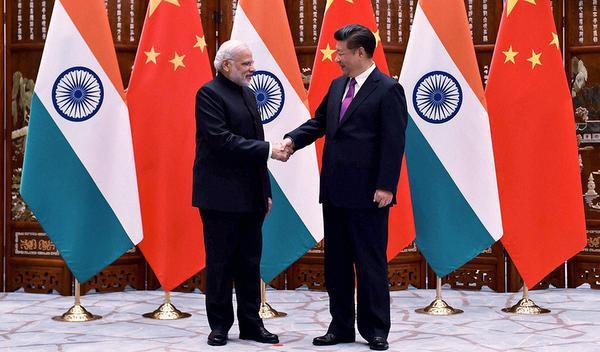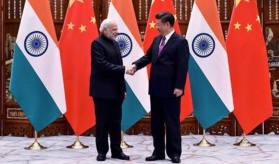Source: People's Daily
As India and Pakistan set to become formal members of the Shanghai Cooperation Organisation (SCO) during its forthcoming summit on 8th June 2017 in Astana, Kazakhstan, there are lot of anxieties as regards the SCO turning into a battleground for settling scores owing to their animosities over the question of Kashmir and diametrically opposite approaches towards counter terrorism. While the Indian Prime Minister, Narendra Modi has thanked the Russian President Vladimir Putin for his ‘active help’ in supporting India’s entry into the SCO, China on Thursday, cautioned both India and Pakistan to ‘strictly follow the SCO Charter, the idea of good neighbourliness, uphold the SCO spirit, improve their relations and inject new impetus to the development of the SCO.’ Indeed, since the SCO is a cohesive political, economic and military bloc contrary to the loose grouping of the BRICS, and perhaps the most successful multilateral organisation in Eurasia and the world; the inclusion of new members certainly offers opportunities as well as challenges.
First and foremost, as China’s GDP surpasses the combined total of all the members, it offers immense opportunities for member states to benefit at bilateral and multilateral levels. As of now, the SCO was limited to China, Russia and Central Asia, the inclusion of India and Pakistan will extend the reach of multilateralism to South Asia, thus expanding its diplomatic, economic, cultural, and security boundaries. The inclusion of more dialogue partners into members, and perhaps further expansion into Europe, will turn the bloc into a real Eurasian organisation, and Eurasia into a ‘Super continent’ as advocated by my friend, Prof. Feng Da Hsuan, Advisor to Rector, Macau University. Even if China and Russia remains dominant economic players in the region, however, India believes there is enough space for its strategic and economic interests in the region. Its connectivity projects in Chabahar in Iran and in energy security in Central Asia, and the International North-South Transport Corridor is a point of reference where polcy could be coordinated.
Moreover, since the regional and trans-regional connectivity, expansion of trade, investment and commerce is the top priority of China in Eurasia and beyond, and since the mechanism of the ‘Belt and Road’ is an important instrument in realising the policy goals, which in turn have been supported by the SCO members, the new entrants, especially India, may have second thought on the same, as it initiates a close policy dialogue with incumbent and new member. It would make sense if India’s connectivity projects could be docked with similar Chinese and Russian projects in the region. It was here in Astana in 2013 that President Xi Jinping floated the idea of building the ‘Silk Road Economic Belt.’
Secondly, in the long run, the SCO may provide an opportunity to resolve outstanding issues between India and Pakistan on one hand, and India and China on the other. It may be remembered that in 1996 when Russia, China, Kazakhstan, Kyrgyzstan, and Tajikistan established the ‘Shanghai Five,’ the idea behind was to resolve border disputes, and downsize military forces along the borders. The resolution of the border disputes has undoubtedly resulted in greater connectivity and economic cooperation between the member states. However, ultimately the borders need to be settled bilaterally, but SCO will certainly ameliorate the environment to certain extent, as there would be frequent meetings between the heads of the states. There are apprehensions too, that Pakistan may attempt to internationalize the Kashmir issue through SCO, but I believe good sense will prevail and the platform will not be used for settling scores on certain issues, especially when the SCO has no such mandate to do so.
Thirdly, since fighting terrorism, separatism, and extremism is another important goal of the SCO ever since its formation in 2001, and during the Tashkent Summit in 2004 a Regional Anti-Terrorist Structure was officially inaugurated in Tashkent, I believe the expansion of the SCO would entail a more coordinated approach on terrorism. Sharing of intelligence, counter terrorism operations and combat experience etc. of various countries will come handy. Nevertheless, since perceptions on cross border terrorism between India and Pakistan are diametrically opposite – if India believes that Pakistan differentiates between good and bad terrorists and uses the ‘good’ terrorists as assets against India, conversely, Pakistan believes India is fomenting trouble in Baluchistan, cooperation especially between the duo would be difficult. The volatile and explosive nature of the issue is also likely to disrupt the proceedings at SCO. Here again, I believe China and Russia will not let the SCO turf to be used for settling scores.
Fourthly, since most of the SCO members have huge stakes in Afghanistan’s security, political and economic stability, they need to devise a magic formula, for the security situation in Afghanistan has been worsening, tensions between Pakistan and Afghanistan are escalating, peace with the Taliban that again owing to diametrically opposite perspectives between some countries is elusive, and the Islamic State expanding its reach in the regions exponentially, thus endangering the regional peace and stability. The trade and connectivity remains the best bet in restive region that will yield better result than the foreign doles, and enable the country to stand on its own feet. Since regional integration form the bulwark of the ‘Belt and Road’ as well as the SCO, member states need to bury their differences and work on these lines to bring stability in Afghanistan.
Finally, in order to have better results, the SCO in true spirits of its Charter, needs to coordinate their policies, integrate their developmental strategies, and pool resources to tap the vast potentials in the region. For India and Pakistan, I believe the SCO will provide an excellent platform for dialogue and constructive cooperation, and hopefully they should be able to narrow down their differences on some issues if not all.
(Author:B. R. Deepak, professor from Center of Chinese and South East Asian Studies under the India-based Jawaharlal Nehru University)
(Source: People’s Daily)
First and foremost, as China’s GDP surpasses the combined total of all the members, it offers immense opportunities for member states to benefit at bilateral and multilateral levels. As of now, the SCO was limited to China, Russia and Central Asia, the inclusion of India and Pakistan will extend the reach of multilateralism to South Asia, thus expanding its diplomatic, economic, cultural, and security boundaries. The inclusion of more dialogue partners into members, and perhaps further expansion into Europe, will turn the bloc into a real Eurasian organisation, and Eurasia into a ‘Super continent’ as advocated by my friend, Prof. Feng Da Hsuan, Advisor to Rector, Macau University. Even if China and Russia remains dominant economic players in the region, however, India believes there is enough space for its strategic and economic interests in the region. Its connectivity projects in Chabahar in Iran and in energy security in Central Asia, and the International North-South Transport Corridor is a point of reference where polcy could be coordinated.
Moreover, since the regional and trans-regional connectivity, expansion of trade, investment and commerce is the top priority of China in Eurasia and beyond, and since the mechanism of the ‘Belt and Road’ is an important instrument in realising the policy goals, which in turn have been supported by the SCO members, the new entrants, especially India, may have second thought on the same, as it initiates a close policy dialogue with incumbent and new member. It would make sense if India’s connectivity projects could be docked with similar Chinese and Russian projects in the region. It was here in Astana in 2013 that President Xi Jinping floated the idea of building the ‘Silk Road Economic Belt.’
Secondly, in the long run, the SCO may provide an opportunity to resolve outstanding issues between India and Pakistan on one hand, and India and China on the other. It may be remembered that in 1996 when Russia, China, Kazakhstan, Kyrgyzstan, and Tajikistan established the ‘Shanghai Five,’ the idea behind was to resolve border disputes, and downsize military forces along the borders. The resolution of the border disputes has undoubtedly resulted in greater connectivity and economic cooperation between the member states. However, ultimately the borders need to be settled bilaterally, but SCO will certainly ameliorate the environment to certain extent, as there would be frequent meetings between the heads of the states. There are apprehensions too, that Pakistan may attempt to internationalize the Kashmir issue through SCO, but I believe good sense will prevail and the platform will not be used for settling scores on certain issues, especially when the SCO has no such mandate to do so.
Thirdly, since fighting terrorism, separatism, and extremism is another important goal of the SCO ever since its formation in 2001, and during the Tashkent Summit in 2004 a Regional Anti-Terrorist Structure was officially inaugurated in Tashkent, I believe the expansion of the SCO would entail a more coordinated approach on terrorism. Sharing of intelligence, counter terrorism operations and combat experience etc. of various countries will come handy. Nevertheless, since perceptions on cross border terrorism between India and Pakistan are diametrically opposite – if India believes that Pakistan differentiates between good and bad terrorists and uses the ‘good’ terrorists as assets against India, conversely, Pakistan believes India is fomenting trouble in Baluchistan, cooperation especially between the duo would be difficult. The volatile and explosive nature of the issue is also likely to disrupt the proceedings at SCO. Here again, I believe China and Russia will not let the SCO turf to be used for settling scores.
Fourthly, since most of the SCO members have huge stakes in Afghanistan’s security, political and economic stability, they need to devise a magic formula, for the security situation in Afghanistan has been worsening, tensions between Pakistan and Afghanistan are escalating, peace with the Taliban that again owing to diametrically opposite perspectives between some countries is elusive, and the Islamic State expanding its reach in the regions exponentially, thus endangering the regional peace and stability. The trade and connectivity remains the best bet in restive region that will yield better result than the foreign doles, and enable the country to stand on its own feet. Since regional integration form the bulwark of the ‘Belt and Road’ as well as the SCO, member states need to bury their differences and work on these lines to bring stability in Afghanistan.
Finally, in order to have better results, the SCO in true spirits of its Charter, needs to coordinate their policies, integrate their developmental strategies, and pool resources to tap the vast potentials in the region. For India and Pakistan, I believe the SCO will provide an excellent platform for dialogue and constructive cooperation, and hopefully they should be able to narrow down their differences on some issues if not all.
(Author:B. R. Deepak, professor from Center of Chinese and South East Asian Studies under the India-based Jawaharlal Nehru University)
(Source: People’s Daily)
 Menu
Menu
 Shanghai Cooperation Organization: What does it mean to India and Pakistan?
Shanghai Cooperation Organization: What does it mean to India and Pakistan?

















